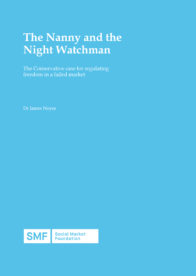In the Conservative political tradition, state regulation is often viewed in binary terms – its presence an intrusion, and its absence a mark of freedom. This has certainly been the case in the ongoing debate surrounding the review of the 2005 Gambling Act. In this personal essay, SMF Senior Fellow Dr James Noyes rejects the binary view in favour of a more nuanced approach to regulation and the role that the state can – and should – play in the gambling market.
What does it mean to be free? Since Thatcher, a libertarian strand in the Conservative Party has promoted economic policies of deregulation and social polices of minimal state intrusion in the lives of individuals. This tradition promotes the idea of a ‘Night Watchman’ government which watches over society with minimal intervention, over that of a ‘Nanny’ state, seen to be meddling uninvited in people’s lives through regulation.
This was the tradition championed by Liz Truss during her leadership campaign and premiership. Watering down the reforms to the gambling market that were promised in the 2019 Conservative election manifesto was one of many Truss-era attempts to reverse what was seen as Johnson-era ‘nannying’.
Yet the approach Truss took was at odds with the worldviews of both Margaret Thatcher and Thatcher’s ideological inspiration Friedrich Hayek. Despite presenting Thatcher and Hayek as her inspirations, Truss’ brief premiership did not reflect their vision of freedom or the role the state can play in society.
In this essay, Dr Noyes looks beyond the Nanny vs. Night Watchman dichotomy by examining an alternative tradition of Conservative thinking to consider the case for appropriately regulating freedom in a failing market. He argues that this is the tradition that Conservatives today, including Prime Minister Rishi Sunak, can draw on when they face the difficult challenge of weighing the balance between market, state and society – starting with the vexed question of gambling reform.

